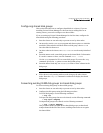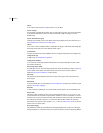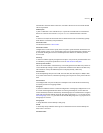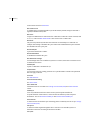
519Configuring Veritas Volume Manager
Configuring cluster support
Configuring shared disk groups
This section describes how to configure shared disks in a cluster. If you are
installing Veritas Volume Manager for the first time or adding disks to an
existing cluster, you need to configure new shared disks.
If you are setting up Veritas Volume Manager for the first time, configure the
shared disks using the following procedure:
1 Start the cluster on one node only to prevent access by other nodes.
2 On one node, run the vxdiskadm program and choose option 1 to initialize
new disks. When asked to add these disks to a disk group, choose
none to
leave the disks for future use.
3 On other nodes in the cluster, run
vxdctl enable to see the newly initialized
disks.
4 From the master node, create disk groups on the shared disks. To determine
if a node is a master or slave, run the command
vxdctl -c mode.
Use the vxdg command or VEA to create disk groups. If you use the vxdg
command, specify the -s option to create shared disk groups.
5 From the master node only, use vxassist or VEA to create volumes in the
disk groups.
Note: RAID-5 volumes are not supported for sharing in a cluster.
6 If the cluster is only running with one node, bring up the other cluster
nodes. Enter the vxdg list command on each node to display the shared
disk groups.
Converting existing VxVM disk groups to shared disk groups
To convert existing disk groups to shared disk groups:
1 Start the cluster on one node only to prevent access by other nodes.
2 Configure the disk groups using the following procedure.
To list all disk groups, use the following command:
# vxdg list
To deport the disk groups that are to be shared, use the following command:
# vxdg deport diskgroup
To import disk groups to be shared, use the following command:
# vxdg -s import diskgroup
This procedure marks the disks in the shared disk groups as shared and
stamps them with the ID of the cluster, enabling other nodes to recognize
the shared disks.


















